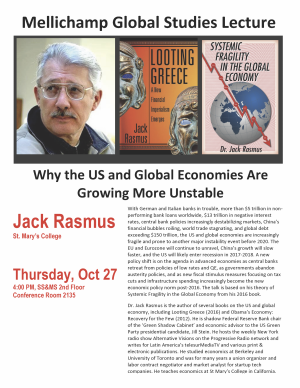Event Date:
Event Date Details:
The lecture will begin at 4:00, followed by a reception in SSMS 2135, down the hall from the Global Studies Department.
Event Location:
- Department of Global Studies
- SSMS 2135 (2nd floor conference room)
Event Price:
Free to the public.
Event Contact:
Kim Coonen, 805-893-4718
With German and Italian banks in trouble, more than $5 trillion in
nonperforming bank loans worldwide, $13 trillion in negative interest
rates, central bank policies increasingly destabilizing markets, China’s
financial bubbles roiling, world trade stagnating, and global debt
exceeding $150 trillion, the US and global economies are increasingly
fragile and prone to another major instability event before 2020.
The EU and Eurozone will continue to unravel, China’s growth will slow
faster, and the US will likely enter recession in 2017-2018. A new
policy shift is on the agenda in advanced economies as central banks
retreat from policies of low rates and QE, as governments abandon
austerity policies, and as new fiscal stimulus measures focusing on tax
cuts and infrastructure spending increasingly become the new
economic policy norm post-2016. The talk is based on his theory of
Systemic Fragility in the Global Economy from his 2016 book.
Dr. Jack Rasmus is the author of several books on the US and global
economy, including Looting Greece (2016) and Obama’s Economy:
Recovery for the Few (2012). He is shadow Federal Reserve Bank chair
of the ‘Green Shadow Cabinet’ and economic advisor to the US Green
Party presidential candidate, Jill Stein. He hosts the weekly New York
radio show Alternative Visions on the Progressive Radio network and
writes for Latin America’s telesurMediaTV and various print &
electronic publications. He studied economics at Berkeley and
University of Toronto and was for many years a union organizer and
labor contract negotiator and market analyst for startup tech
companies. He teaches economics at St Mary’s College in California.



